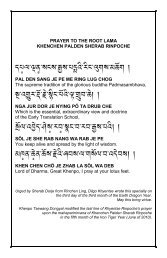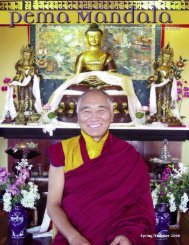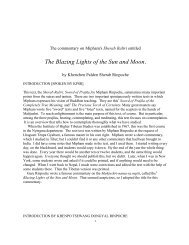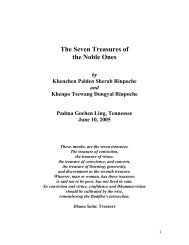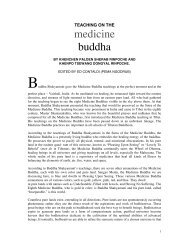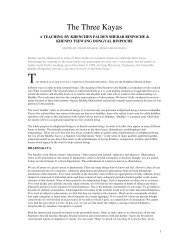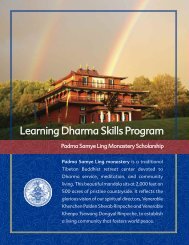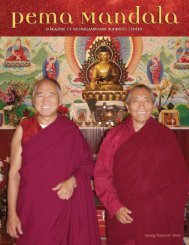6 Pema Mandala Spring 07:Pema Mandala - Padmasambhava ...
6 Pema Mandala Spring 07:Pema Mandala - Padmasambhava ...
6 Pema Mandala Spring 07:Pema Mandala - Padmasambhava ...
You also want an ePaper? Increase the reach of your titles
YUMPU automatically turns print PDFs into web optimized ePapers that Google loves.
we said, even this acknowledgement itself is meritorious and<br />
should be dedicated.<br />
STUDENT: How can we connect more with the three vajra states<br />
during creation stage (kyerim) practice How do we see all form<br />
as the body of the deity, hear all sound as the recitation of the<br />
deity’s mantra, and experience all conceptions as the play of the<br />
deity’s wisdom mind<br />
KHENPOS: It is true that we can experience doubt and hesitation<br />
during creation stage practice. Doubt can easily and naturally<br />
arise since this is the normal, mundane way we think. At<br />
these times, however, we should investigate the one who is visualizing<br />
the deity, such as Vajrasattva or Vajrakilaya. This person<br />
is none other than mind itself. And we should ask ourselves,<br />
“Where is this mind” Upon looking, we cannot pinpoint any<br />
location, since mind is emptiness. Therefore, all arising conceptions<br />
such as, “I am not really the deity,” come from this empty<br />
mind.<br />
Thoughts can come in many different forms, since the arising<br />
energy of mind is not regulated by anything. But, during<br />
practice we are not going to follow the movement of conceptions,<br />
including doubt and hesitation. These are mere appearances<br />
of the emptiness of mind. Instead, we are going to bring<br />
forth confidence, thinking, “I am Vajrakilaya.<br />
Emptiness mind is the nature of Vajrakilaya.”<br />
From emptiness mind we arise as the deity and<br />
we therefore perceive all phenomena as inseparable<br />
from the deity. In this way, we usher forth<br />
our vajra pride, or natural confidence, and actually<br />
abide in the wisdom state. This is known as<br />
“connecting with the nature of mind.”<br />
We are allowing emptiness mind—our own<br />
awareness—to arise in the form of Vajrakilaya,<br />
which is also empty. Therefore, the entire universe<br />
of form and everything that we perceive is none other<br />
than the display of our own minds. Because our minds are now<br />
inseparable from Vajrakilaya, we see everything from<br />
Vajrakilaya’s perspective, unobscured by duality mind and<br />
unregulated by grasping and clinging. By practicing in this way,<br />
we are going to immediately stop our habitual thought patterns<br />
of grasping and clinging. We are going to allow the emptiness<br />
of mind to arise as the new, fresh perspective of Vajrakilaya.<br />
Because there is no division between Vajrakilaya and our<br />
own minds, everything we hear is the sound of Vajrakilaya, and<br />
our awareness itself is the mind of Vajrakilaya. As the teachings<br />
say, the purpose of this visualization is to destroy and uproot the<br />
solidity of our habitual patterns. Free from doubt and hesitation,<br />
we will practice the generation stage with confidence and with<br />
the recognition of the nature of mind.<br />
STUDENT: What do we do if we have doubt about being able to<br />
truly relax in the completion stage (dzogrim)<br />
KHENPOS: In general, “completion stage” refers to going<br />
beyond all grasping and objects of thought. The essence of the<br />
completion state is Dzogchen meditation. To use the example<br />
we just gave, we should investigate where the visualization is<br />
coming from. Once again, these visualizations arise from emptiness<br />
mind. Yet, when we investigate the location of mind<br />
itself—where it arises, where it abides, and where it ceases—we<br />
don’t find anything, since there is no substantially existing<br />
mind. This not-finding is Dzogchen. When we don’t find mind<br />
upon looking for it, the not-finding itself is actually the state of<br />
Dzogchen. Simply relax and rest in this state without any second-guessing,<br />
free from doubt and hesitation. This is a brief discussion<br />
of the mind.<br />
We should also examine external objects. Following the<br />
logic of Madhyamaka, we can analyze the nature of the objects<br />
of our perception. For example, “Where is this table” When we<br />
break down the table in an attempt to find its essence, we eventually<br />
reach the atomic level. However, even the atoms themselves<br />
do not exist in a substantial or solid way. Actually, the<br />
entire universe is in this state: there is no substantially-solid<br />
existence, no intrinsic core to phenomena. Everything we normally<br />
perceive is actually a combination of causes, conditions,<br />
Relax in the fresh, original, unfabricated<br />
state of the nature of mind. We have<br />
reached the zero point, where even zero<br />
has disappeared.<br />
and hallucinations that combine to form our present perceptions.<br />
When we examine in this way, we discover the empty<br />
nature of phenomena.<br />
According to the teachings of the Vajrayana, during the dissolution<br />
stage everything dissolves into the deity, who then dissolves<br />
into the heart syllable of the deity. The heart syllable<br />
itself finally dissolves into the state of the true nature. This<br />
means that every focal point we were previously holding in our<br />
awareness, including all the aspects of the visualization, dissolve<br />
back into the ultimate state of the true nature. There is nothing<br />
to focus on, and even our focus itself completely dissolves. Relax<br />
in the fresh, original, unfabricated state of the nature of mind.<br />
This is Dzogchen, the ultimate state of the completion stage.<br />
Resting in this state, there is really no need for doubt, because<br />
mind has released all thought fabrications. We have reached<br />
the zero point, where even zero has disappeared. Just relax in<br />
this state. This is the completion stage of Dzogchen. ■<br />
SPRING/SUMMER 20<strong>07</strong> | <strong>Pema</strong> <strong>Mandala</strong> 11




